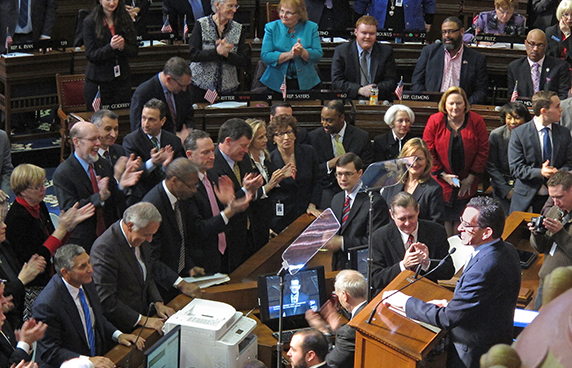Governor Proposes $19 Billion Revised State Budget

Governor Malloy last week proposed a revised, $19 billion budget for the second year of the biennium that addresses economic priorities, provides some tax relief, boosts education, and adds to the state’s Rainy Day Fund. The overall state budget, including Medicaid spending, would be $22 billion.
The $19 billion proposal increases state non-Medicaid spending overall by $37.2 million (2.7%) for fiscal year 2016, but stays under the state’s constitutional spending cap by $8.1 million.
According to the governor’s budget director, Ben Barnes, the proposed 2.7% increase would be a “sustainable” growth rate over time to avoid deficits in subsequent fiscal years.

- $250 million for the state’s Rainy Day Fund
- $100 million extra payment for state’s pension obligations
- $155 million in gasoline and sales tax refunds
Surplus Questioned
Senate Minority Leader John McKinney (R-Fairfield) and House Republican Leader Larry Cafero (R-Norwalk) both questioned the surplus and said it pales in comparison with budget deficits facing the state in fiscal years 2016, 2017 and 2018. They noted that the surplus is due in large part to the major tax increase and borrowing the governor included in his first biennial budget.
While the Republican leaders said the use of surplus funds, in principle, to bolster the Rainy Day Fund and to pay down long-term debt is a good idea, they labeled the proposed tax refunds as election-year politics.
Lawmakers will consider the governor’s proposals, and their own, during the 2014 session of the General Assembly that will run until midnight on Wednesday, May 7.
Economic growth
The governor also proposed several actions as part of what he says is his administration’s “aggressive role partnering with employers to create jobs and grow our economy”:
- Creating an Advanced Manufacturing Fund, with $25 million in seed funds, to help Connecticut manufacturers create jobs
- Increasing funding for the state’s Manufacturing Assistance Act
- Continuing funding of the Small Business Express program
- Expanding the state’s successful STEP Up job-training program with $10 million
- Extending the Angel Investor Tax Credit ($3 million)
- Creating a statewide “Platform to Employment” program to help long-term employed get back to work
Education
The governor proposed several actions to “help give every Connecticut student access to a great education”:
- Expansion of pre-kindergarten programs by as many as 1,000 slots next year and up to 4,000 slots by 2019
- $10 million for school security
- Creation of a tax-free college savings plan, starting this year, for every child born or adopted in Connecticut
- Funding the “Transform CSU 2020” program to consolidate Connecticut’s university system
Transportation
With Connecticut’s aging transportation infrastructure in need of repair and replacement, the governor proposed transferring $380 million from the General Fund into the Special Transportation Fund. Among other things, this will increase the number of active, shovel-ready Department of Transportation projects, add over 100 engineers to the agency’s staff, and allow DOT to use more efficient project-delivery methods. Also in the budget is nearly $50 million to improve commuter rail in the state.
Long-Term healthcare
Reducing Connecticut’s long-term healthcare costs and improving services to the people of the state is one of the most important needs facing policymakers. The governor’s proposal expands long-term services and supports to help accelerate the state’s rebalancing of long-term healthcare from institutional to in-home care.
Regulatory Reform
One of biggest keys to making Connecticut more competitive is making the state’s regulatory climate more user-friendly for business. The governor said that the state had “started the task of bringing Connecticut’s’ regulations into the 21st century.” After asking for the input of businesses, the governor said he would soon announce plans to eliminate “nearly one thousand pages of unnecessary state regulations.”
Tax relief
In addition to the one-time, gas and sales tax rebate, the governor’s also includes:
- A two-stage exemption from the state income tax for retired teachers’ pensions
- Restoration of the state’s Earned Income Tax Credit to 30%
- Exemption of clothing purchases of less than $50 from sales tax
Municipalities:
Several aspects of the revised budget are designed to help Connecticut’s municipalities, including:
- Expanding the PILOT program to nonprofit hospitals and colleges
- Increasing the Educational Cost Sharing grants by $40 million
- Allowing municipalities to delay revaluations by two years
- Exempting municipalities from the state’s health insurance premium tax
The governor’s budget revisions can be seen here.
His state of the state address can be seen here.
RELATED
EXPLORE BY CATEGORY
Stay Connected with CBIA News Digests
The latest news and information delivered directly to your inbox.


